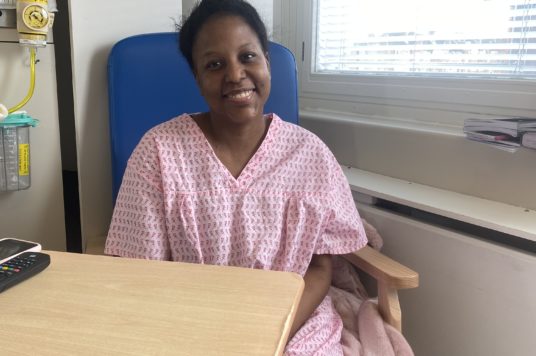Success in transplants provides a lifeline for sickle cell patients
A sickle cell patient has been given ‘a new lease of life’ after having a rare haematopoietic stem cell transplant to treat her chronic illness at St George’s University Hospital.
43-year-old Anusjka Regis-Etumnu has battled with sickle cell disease her entire life, with her parents discovering she had it when she was just three months old.
Sickle cell disease affects red blood cells causing them to appear sickle shaped rather than round. Clotting of these misshapen cells can cause what is known as a crisis. When a crisis occurs, sickle cell patients can experience severe pain that can lead to hospitalisations and in some rarer cases, crisis can even be fatal.
Anusjka shares her experience growing up with sickle cell disease:
“Having sickle cell meant my life was very limited, I had a super sporty family, but I couldn’t get involved because becoming fatigued can trigger a crisis.
“Sickle cell effects every part of your life. Socially, psychologically, physically, just everything. It’s been a tough life, but I’ve tried to be as resilient as I can.”
In 2020, the NHS began commissioning stem cell transplants for sickle cell patients. As it is a highly specialised procedure, all patients considered for transplants need to be approved by the national panel which includes experts treating sickle cell anaemia.
Dr Mickey Koh, Consultant Haematologist at St George’s, presented Anusjka’s case which was approved by the panel and Anusjka underwent her transplant in April 2022. Her donor was her fully matched sister who lives in Trinidad and Tobago.
Dr Mickey Koh said:
‘Anusjka was admitted to us at St George’s for the transplant which proved successful. Currently, she no longer has any sickle blood in her system and Anusjka’s body is now making the right type of red blood cell.’
The haematopoietic stem cell transplantation team at St George’s are commended for their many successes, so much so that in this year’s British Society of Blood and Marrow Transplantation and Cellular Therapy (BSBMT) annual report, the St George’s team were singled out for praise by NHS England. They were commended for having a statistically significantly better* 5-year overall survival for patients receiving allogeneic transplant compared to the national average.
Dr Richard Jennings, Group Chief Medical Officer for St George’s, Epsom and St Helier University Hospitals and Health Group said:
“The stem cell transplant team at St George’s do truly remarkable work and transform the lives of patients they treat, like Anusjka. This team is an asset to team St George’s, and we wish Anusjka all the best.”
At the end of her Anusjka’s month long hospital stay, she said:
“How I feel right now is that the stem cell transplant is going to give me a new lease of life. It’s changed my whole perspective.”
Anusjka is one of many patients who have benefitted from a stem cell transplant at St George’s. The transplant team have continued to work hard and have seen several successes during the pandemic.
Dr Matthias Klammer, Clinical Lead for Stem Cell Transplantation at St George’s, said:
‘Our team at St George’s were also able to continue transplants throughout the pandemic by developing a ‘super green’ pathway to protect patients from Covid who were receiving either a kidney transplant or a haematopoietic stem cell transplant.
‘This meant that the team were able to continue to increase the number of transplants performed, having completed 48 in 2019 and 58 in 2022.’
Notes to editors
St George’s University Hospital FT
St George’s University Hospitals NHS Foundation Trust is the largest healthcare provider, major teaching hospital and tertiary centre for south west London, Surrey and beyond – and one of the largest healthcare providers in the UK – serving a population of 3.5 million.
Its main site, St George’s Hospital – one of the country’s principal teaching hospitals – is shared with St George’s, University of London, which trains medical students and carries out advanced medical research.
St George’s is one of 11 adult and children major trauma centres in the UK, one of eight hyper acute stroke units and one of the biggest and busiest of the eight heart attack centres in London.
It is also an accredited centre of excellence for trauma, neurology, cardiology, cancer and blood pressure services and is the national centre for family HIV care and bone marrow transplantation for non-cancer diseases.
St George’s children’s services are rated outstanding by the CQC.
*St George’s haematopoietic stem cell transplantation team have a 70% survival rate five years after surgery, significantly better than the average in UK.
Super green pathway
A super green pathway is where patients are asked to stay at home and isolate for 14 days prior to their procedure and are tested for Covid-19 prior to admission. No patients are admitted into the ward if they have not fulfilled this requirement.
In addition, all staff members working in the transplant ward at the respective hospitals, in the case St George’s, undergo weekly surveillance screening via PCR for Covid-19.


